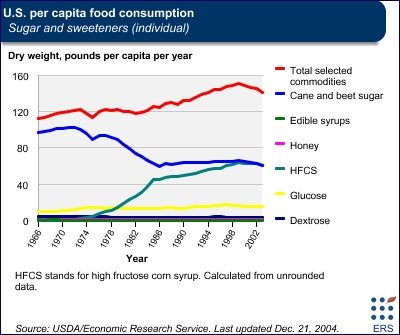Monday, May 15, 2006
More HFCS tidbits

I was not aware that HFCS was relatively new, and I have been surprised to learn, though reading reports about the WTO litigation about the industry, that it is taking over the sugar market in the US and other countries. Here is an interesting summary from the Washington Post reviewing the relationship between sugars, insulin and sweetener production:
"For example, consumption of glucose kicks off a cascade of biochemical reactions. It increases production of insulin by the pancreas, which enables sugar in the blood to be transported into cells, where it can be used for energy. It increases production of leptin, a hormone that helps regulate appetite and fat storage, and it suppresses production of another hormone made by the stomach, ghrelin, that helps regulate food intake. It has been theorized that when ghrelin levels drop, as they do after eating carbohydrates composed of glucose, hunger declines.
Fructose is a different story. It "appears to behave more like fat with respect to the hormones involved in body weight regulation," explains Peter Havel, associate professor of nutrition at the University of California, Davis. "Fructose doesn't stimulate insulin secretion. It doesn't increase leptin production or suppress production of ghrelin. That suggests that consuming a lot of fructose, like consuming too much fat, could contribute to weight gain." Whether it actually does do this is not known "because the studies have not been conducted," said Havel.
Another concern is the action of fructose in the liver, where it is converted into the chemical backbone of trigylcerides more efficiently than glucose. Like low-density lipoprotein -- the most damaging form of cholesterol -- elevated levels of trigylcerides are linked to an increased risk of heart disease. A University of Minnesota study published in the American Journal of Clinical Nutrition in 2000 found that in men, but not in women, fructose "produced significantly higher [blood] levels" than did glucose. The researchers, led by J.P Bantle, concluded that "diets high in added fructose may be undesirable, particularly for men."

